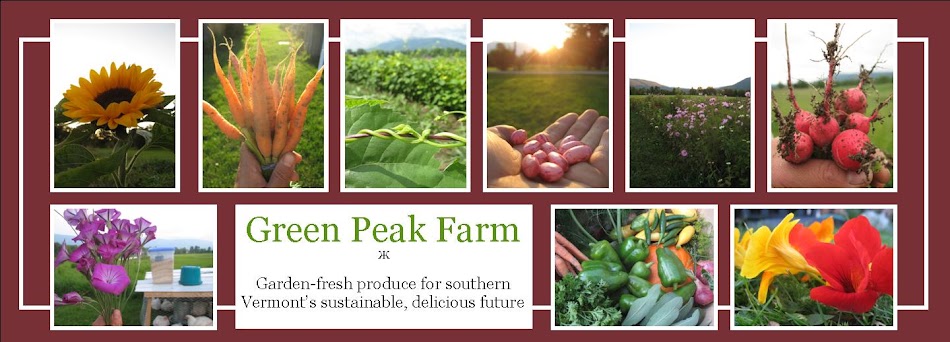Recently, a friend of a friend contacted me with some questions about getting involved with organic farming. Here are some thoughts...
There are so, so many great farms out there to help you build experience-- I'd highly recommend checking out ATTRA/NCAT: http://attra.ncat.org/attra-pub/internships/. These guys are the National Sustainable Ag Information Service folks, and have a good reputation for valuable farming apprenticeships/internships. Farms that have their acts together enough to post on NCAT are usually pretty well-poised to give you a good experience.
Personally, I have not WWOOFed, though I've heard several mixed reviews. I think WWOOF is a great program to dip your toes into the sustainable agriculture world, and also really useful if you're looking for a short-term, low-commitment experience or a place to stay while you're travelling. From a farmer's perspective, having untrained, uneducated workers (granted, farming is not rocket science...) can almost be more of a liability/time-sink, as most farmers can do the work that needs to get done in half the time it takes to explain someone new where to go, how to do it, what you expect, and all that jazz. So, in my opinion, if you're looking for a valuable apprenticeship, the farmer ought to be willing to invest a fair amount of his or her time in educating you-- and, though this is not always the case-- money, too. As with any job, there must be fairness in the exchange of labor/knowledge/time/money, etc. Also, the infrastructure for farm apprenticeships is forming; passing along education is easy enough, but the next generation of farmers must also be endowed with enough opportunities to capital to be able to start their own operations up.
(This is all not to say that I haven't worked 65-hour weeks for almost no pay. But, you know when it's worth it, and when it's not.)
Other good links to valuable internships: look into the regional Organic Associations-- most of them have newsletters, and they're often available online. For example, in Oregon, there's Oregon Tilth, which is the certifying agency/association; the Northeast Organic Farming Assoc. (NOFA) has several different state-associations (www.nofavt.org) or www.mofga.org for Maine. OSALT is anther good one for Oregon.
Good questions to ask yourself and potential farms that you might like to work for:
- what kind of turnover does the farm labor have? Do former interns stay in the area? How long are you willing to be in one spot?
- what specific tasks will I be doing? (a lot of big CSAs will simply have you harvesting, all. day. long. Is this interesting to you?) Will you actually be included in the planning phases, seed ordering, etc? (Most of this planning is happening mid-late winter) What are you interested in learning?
- where do most of the farm laborers/other apprentices come from? Are they local folks, college kids, migrant workers?
- how much time will you spend working side-by-side with the lead farmer?
- what is your farm's primary geographic market area? What's your farm's idea of local produce (for example, the scale of what-is-local shifts massively when you get out West)
- this one's surprisingly revealing: what does the crew do for lunch? Do people eat/cook together? Does everyone part ways? Is there a break-room/table/fridge for you guys to use?
- why does he/she farm? Go to a place where they love what they do. It's way too hard a job/lifestyle to not love what you do.
A lot of saavy farmers will invite you to come and work for a day or two, or sometimes even a week, as a trial run. In really small operations, as most sustainable, organic farms are, it is so, important to find the right fit of people that you can work side-by-side with, as well as live with, eat with, and sweat with during quite long days. I'd almost be wary of a farm that's willing to take you on without trying you out/letting you try them out.
Other great opportunities lie in educational farms/foundations. You may find that, as the pressure to maximize yields and capital decreases (albeit slightly), your farmer's willingness/time to educate you increases. This is certainly not always the case; some farmers are truly superhuman, and these are the best ones to work for!
Good luck, and please keep me posted about your progress. I love hearing stories!
